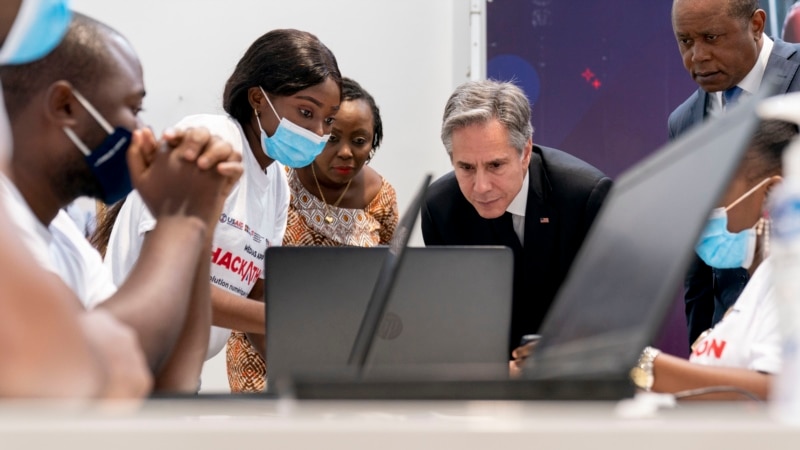U.S. Secretary of State Antony Blinken headed for Rwanda Wednesday after meeting with Democratic Republic of Congo leaders to discuss tensions and human rights challenges in Africa’s Great Lakes region.
Blinken was to arrive in Kigali on Wednesday evening for what the State Department said are continuing efforts to engage with African leaders on U.S. strategy for sub-Saharan Africa, with the aim of strengthening U.S.-Rwandan relations.
Key issues to be addressed during Blinken’s visit are the tensions between Rwanda and the Democratic Republic of the Congo, and other conflicts in the region.
Human Rights Watch’s Central African Director Lewis Mudge said there is blatant disregard for human rights in the region and conflict continues to disrupt the lives of innocent civilians. He said Blinken must use this opportunity to reiterate the United States’ commitment to protecting the rights of people in the region.
“He really should use this as an opportunity to reinforce to [presidents] Felix Tshisekedi and Paul Kagame in DRC Congo and in Rwanda, respectively, that the United States wants to continue to be a partner to Rwanda and Congo,” Mudge said, “but only in so much that steps are taken to respect human rights and principles.”
Blinken and Rwanda officials will likely discuss fighting in Congo that involves rebel group M23. In 2013, the U.S. blocked military aid to Rwanda due to its alleged support for the group, which is believed to use child soldiers, according to the State Department.
Another issue on the table is Rwanda’s imprisonment of U.S. permanent resident Paul Rusesabagina.
According to Trial Watch, a legal organization monitoring trials globally, Rusesabagina’s trial in 2020 did not conform to international and regional standards. Rusesabagina’s actions arguably saved hundreds of lives during the 1994 genocide and inspired the movie “Hotel Rwanda.”
Rwanda’s government has repeatedly refuted these claims, but officials said they are open to exchange views on human rights and governance during Blinken’s visit.
Gatete Nyiringabo Ruhumuliza, a human rights lawyer in Rwanda, argues that the country has a commitment to human rights and is seeing benefits because of it.
“For Rwandans, human rights is not a concept. For Rwandans, human right is an action,” Ruhumuliza said. “Human rights mean last week they [the government] increased salaries of teachers. This is what we consider human rights. Human rights is not two people, three people quarreling on television. Human rights for Rwandans after what happened to us, human rights is action, it is seeing our livelihoods change, it is security.”
Ishmael Buchanan is a lecturer of foreign relations and diplomacy at the University of Rwanda. He said a new Cold War-like environment will influence the outcome of these discussions as the U.S. is vying with Russia and China for relations in Africa.
“We have so many investors from the United States of America. So, obviously it is going to affect them too,” he said. “So, both countries are going to look at their national interests.”
Buchanan said that included the Rusesabagina case.
“What is going to happen is just a matter of dialogue and the understanding they will come to,” he said.
The government of Rwanda said addressing security challenges in the Great Lakes region is a key priority, and that Rwanda remains committed to the various regional mechanisms in place to find durable solutions.

